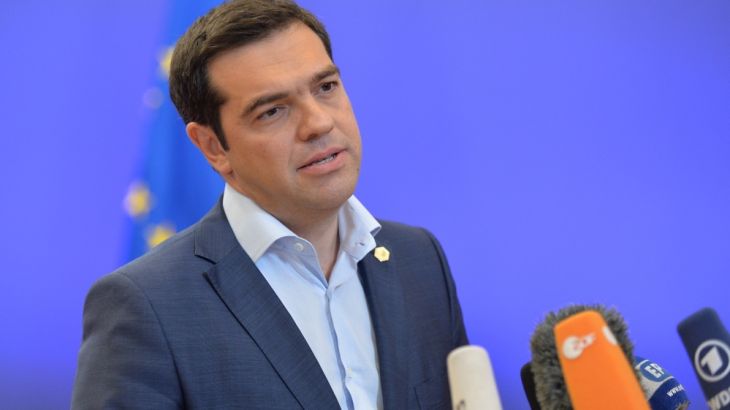Greece to present aid deal proposal at eurozone summit
Greek government sources say PM will put a new deal on the table at emergency eurozone summit in Brussels on Tuesday.

Greek Prime Minister Alexis Tsipras and German Chancellor Angela Merkel have agreed that Athens will present a fresh Greek proposal for an aid deal with creditors at an emergency eurozone summit in Brussels on Tuesday, according to two Greek government sources.
|
|
A Greek official, who spoke on condition of anonymity, revealed the agreement to the Reuters news agency, but gave no further details of Monday’s telephone conversation between the two leaders, which comes a day after Greeks voted overwhelmingly to reject the terms of an international bailout deal.
Keep reading
list of 4 itemsWhy are nations racing to buy weapons?
Parallel economy: How Russia is defying the West’s boycott
US House approves aid package worth billions for Ukraine, Israel
Another source, speaking to the AFP news agency, also said the proposal would be presented on Tuesday.
“They agreed that the prime minister [Tsipras] will present the proposals of the Greek government at the summit [on Tuesday],” the source said.
Voters, who had been asked whether to accept or reject the austerity measures demanded by lenders in return for rescue loans, delivered a resounding 61-percent strong “No” vote on Sunday.
Following her meeting with French President Francois Hollande in Paris, German Chancellor Angela Merkel said it was “urgent” to have precise proposals from Greece over a bailout deal.
Hollande said that the door was open for discussions with Greece, adding that they would respect the will of the Greek people.
Varoufakis resigns
Earlier on Monday, Greek Finance Minister Yanis Varoufakis announced his resignation.
| Profile: Euclid Tsakalotos |
|
The incomingGreek finance minister, Euclid Tsakalotos, was born in 1960 in Rotterdam, the Netherlands. He studied economics, politics andphilosophy at the universities of Oxford and Sussex, before completing his PhDin 1989 at the University of Oxford. He has taught at the University of Kent, the Athens University of Economics and the National and Kapodistrian University of Athens. He is theauthor of six books and many articles, and editor of three volumes. In May 2012 and January 2015, he was elected an MP of the Coalition of theRadical Left (Syriza). |
“Soon after the announcement of the referendum results, I was made aware of a certain preference by some Eurogroup participants, and assorted ‘partners’, for my ‘absence’ from its meetings,” Varoufakis, who had often clashed with creditors in negotiations over the past months, said on his blog after announcing the news on Twitter.
It was “an idea that the prime minister judged to be potentially helpful to him in reaching an agreement. For this reason I am leaving the Ministry of Finance today,” he said.
Varoufakis warned that the referendum result “comes with a large price tag attached … like all struggles for democratic rights”.
James Galbraith, a professor of economy at the University of Texas and a friend of Varoufakis, said that through the referendum results, Greeks have made a move to transform the politics of Europe.
“And Yanis has played an important role in this. He has been saying that Greek debt should be restructured and as the finance minister he took up that agenda,” he said.
On Monday evening, Greece named economist Euclid Tsakalotos, its top negotiator in the stalled EU-IMF talks, as the country’s new finance minister, the president’s office said.
Tsakalotos said, Greeks “deserved a better deal” and “could not accept a non-viable deal”.
“Greek people on Sunday proved that they were not afraid,” he said.
Thousands of pro-government supporters cheered and hugged each other in central Athens in celebration on Sunday night, although some other Greeks expressed pessimism that Tsipras would be able to deliver on his promises.
‘Debt will be negotiated’
In a televised address after the referendum, Tsipras said the European Central Bank, the European Commission and the International Monetary Fund, who crafted Greece’s bailout programme, would now finally have to talk about restructuring the massive, 240-billion-euro ($267bn) debt Greece owes them.
“This time, the debt will be on the negotiating table,” he said, insisting that an IMF report seen this week “confirms Greek views that restructuring the debt is necessary”.
OPINION: Syriza’s lies and empty promises
Tsipras said that the referendum results did not mean Athens was heading to leave the eurozone.
“This is not a mandate of rupture with Europe, but a mandate that bolsters our negotiating strength to achieve a viable deal,” he said.
|
|
The ruling Syriza government had closed the country’s banks and imposed capital controls until July 6 to stem the flood of withdrawals after the bailout deal failed.
The cash-strapped nation eventually defaulted on an IMF payment of $1.8bn on June 30.
The same day, the last bailout for Greece ran out, despite Tsipras’ appeals for it to be extended until the referendum was over.
Al Jazeera’s Barnaby Phillips, reporting from Athens, said the referendum result was likely to embolden the prime minister to go back to Europe and demand a better deal for Greece.
Regarding the finance minister, Phillips said: “Greeks have made a move to transform the politics of Europe. And Yannis has played an important role in this.
“He has been saying that Greek debt should be restructured and as the finance minister he took up that agenda.”